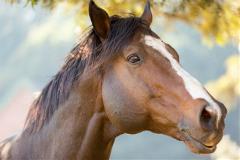Age is Just a Number: Considerations for Senior Horses

There are many factors that can influence the lifespan of a horse. While genetics and nutrition play an important role, the greatest impact comes from the type of care the animal received throughout its life. While the animal’s age does need to be considered, a healthy horse that is now a senior has just as much to offer as it did when it was younger.
The following information identifies three areas that should be considered important when trying to maintain the comfort of a healthy, senior horse.
Maintaining the Comfort of a Senior Horse
Conditioning and Exercising
Maintaining regular periods of exercise benefit the senior horse, Points to keep in mind:
- Senior horses respond better when kept in working condition vs. an extended layoff, such as over winter; it is recommended to keep the animal conditioned, even if workout only consists of a walking ride and daily stable turnout
- Horses need to be able to move about freely in order to keep their joints and muscles healthy, limit stabling if possible
- An older horse requires a longer warm-up period before starting to exercise, and an extended cool-down period following the workout
- The older animal may tire quicker and require longer rest periods between workouts
- While a healthy older horse is capable of pleasure riding, showing, trail riding, and jumping, the horse will never be as fast or as agile as they were in their younger years, if the workout appears too strenuous, transition to an exercise less physically demanding
Tack
Older horses experience physical changes that can alter the fit of their tack, for example:
- Looking at the backline of an older horse, when the spine is no longer straight, but appears curved downward, the horse is referred to as swayback
- This change in body shape is a good indication that their old saddle will no longer be comfortable, and the horse needs to be fitted for a different saddle and pad that won’t cause rubbing, pain, or discomfort
- Older horses often experience changes that affect their teeth and the shape of their jaw
- If the animal is chewing or bouncing the bit around in their mouth, the equipment needs to be checked not only for fit, but also for the possibility that the horse is experiencing pain or may need some dental care
Hoof Care
Routine preventive hoof care is necessary for all horses, but it can cause excessive soreness in older horses because of the leg lifting and weight shifting.
- When an older horse shows signs of being stiff or sore following a farrier’s visit, clients should know to consult with their veterinarian about providing their animal with a non-steroidal anti-inflammatory drug before the trimming or shoeing work begins
- Clients can ask their farrier to consider the use of a Hoofjack which will provide the animal with extra support, remove the added weight off of its other legs, as well as off the farrier’s body
Clients need to watch their older horse for signs of age-related physical changes. If the animal appears uncomfortable or to be struggling, it may be time to transition to a routine that is still enjoyable for both client and horse, but more tolerant of the animal’s age and abilities.
Contact your Covetrus representative at 855.724.3461 for more information about talking to horse clients.
Source:http://www.thehorse.com/free-reports/31839/seven-senior-horse-facts
Need Regulatory Assistance
If you need help with regulatory or licensing issues, we're happy to help. We have a wide variety of resources to help you when issues arise.

Careers
Are you looking for a place to let your talents shine? At Covetrus, we help our practitioner customers better serve their patients and take pride in providing the best customer experience possible. Search our open positions to see our available opportunities.
Newsletter
Stay current with what’s going on with Covetrus, subscribe to receive our newsletter and email communications. Subscribers will receive the latest information in practice management, sales and marketing, animal health, and more.


Leave a comment